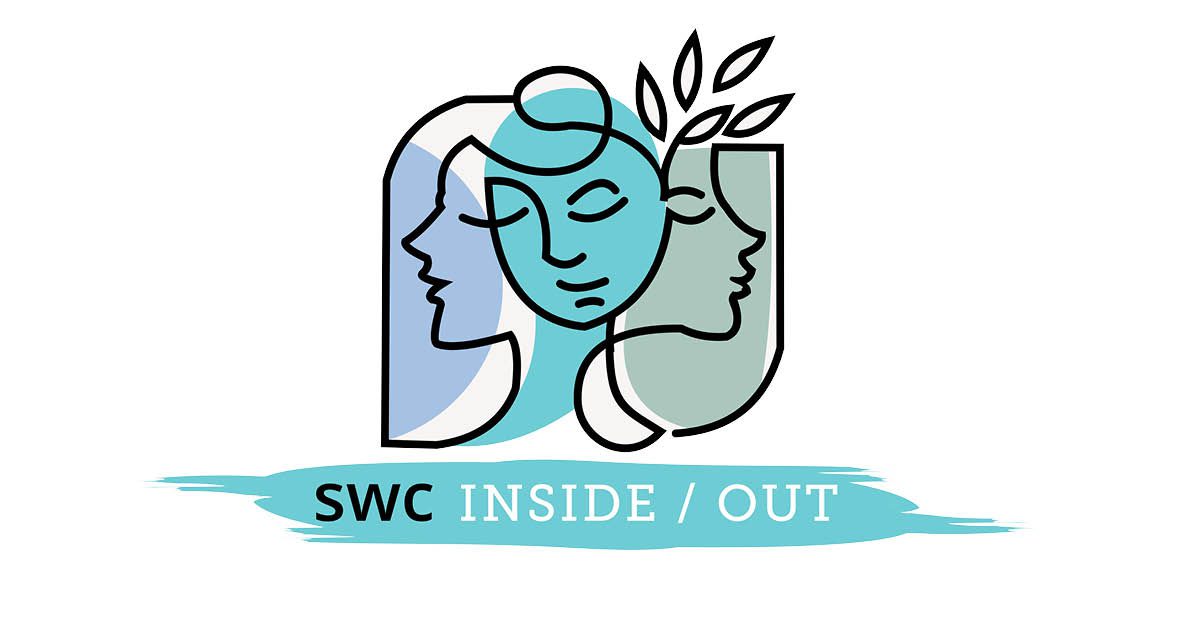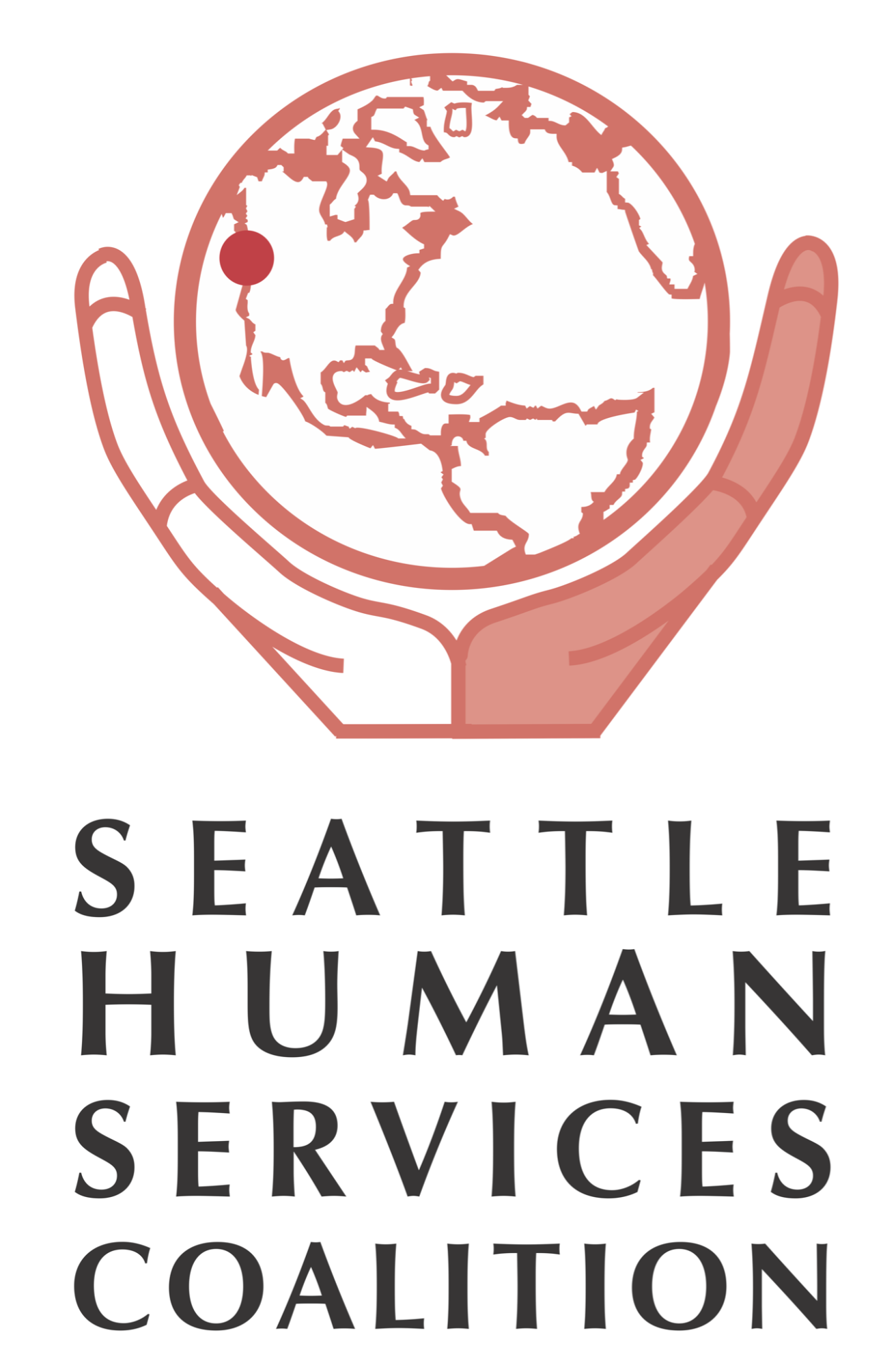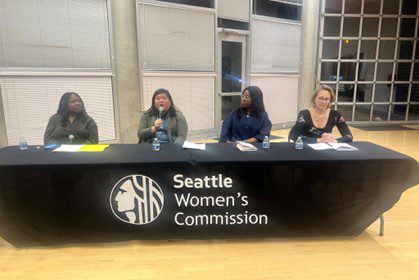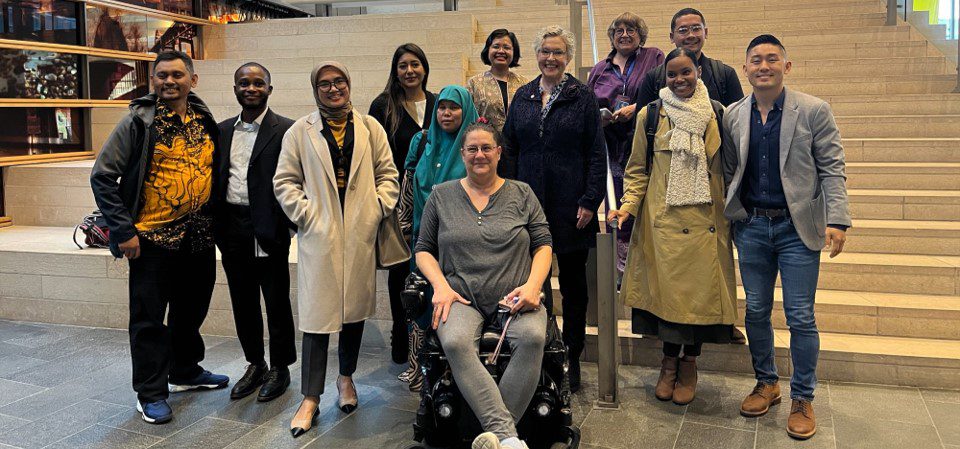
Welcome to SWC Inside/Out, an interview series with members of the Seattle Women’s Commission and the community members who inspire us. This is the third installment of the series. We are thrilled to be talking with the team at the Seattle Human Services Coalition about their recently released wage equity study for nonprofit human services workers commissioned as part of their advocacy campaign, Raising Wages for Changing Lives.
For many people, particularly those working in the human services sector, the results of this report, that human services workers are severely underpaid, is not shocking. Why is making this explicit in a study such as this important and what unique information does this study add to the wage equity conversation?
The general public does not have a good understanding of what human services are. In a 2015 survey of 5,000 adults, nearly two thirds of respondents had no idea how to describe human services correctly. Care work in our society is invisible labor, work that has historically been performed by women and people of color. This history contributes towards a lack of understanding and negative perceptions of human services, and the workers who perform them.
Policymakers need data. While there is general agreement that human service worker wages are too low, there is a lack of data on how much human service workers should be paid. This report is the first time a comparable worth analysis has been used to examine provider wages across the entire human service sector. Comparable worth is the idea of “equal pay for equivalent work”, ensuring that jobs with similar skill sets and levels of complexity are equally compensated regardless of which firm or industry employs those workers. This report offers objective data that shows the truth of just how deep this disparity and discrimination goes. And it gives us a clear target to correct it!
One of the short-term recommendations in the report is to “consider wage increases as a necessary part of ongoing racial and gender equity work in the City of Seattle and King County.” Is there an opportunity to support this from a policy and advocacy perspective at the City and/or State level?
Government contracting practices with nonprofit providers are desperately in need of reform. There are stark differences in contracting practices between human services and other industries. To use construction as an example, construction companies actively seek out public projects to make up for losses they may incur from the privately financed contracts they take.
In human services, we have to fundraise from the communities we serve and from philanthropists to subsidize the contracts we receive from the government.
This is a great example of the opportunity that exists to correct racial and gender inequity. The construction industry remains dominated by white men, while human services providers are 80% women and disproportionately people of color. Contract reform is most definitely in order, and SHSC is a member of multiple statewide coalition groups such as Brave Commitments and the Nonprofit Association of Washington who are championing these reforms.
This report talks a lot about what nonprofits, funders, and the government can do to address wage equity in the human services sector. Is there a role for individuals to play? If so, what are some tangible actions one can take?
Every individual is a trusted messenger in their community. Since most people do not know what human services are, everyone has a role to play in educating their community on the importance of the sector. We need people to help raise awareness and understanding about the necessity of youth programming, senior services, food banks, support for people experiencing gender-based violence, for people experiencing homelessness in conversations with their friends, neighbors, and coworkers. And we need people to put pressure on our elected officials to focus on these issues.
The best way for an individual to support this work is to add your name to the Raising Wages for Changing Lives campaign. This is the best way to learn more and take action!
One of the focus areas of the Seattle Women’s Commission is affordable childcare, a job highlighted in this report specifically. What are the implications for parents, children, and communities when wages for such a critical sector are so low?
When providers can’t make a living wage, they can’t afford to be providers. People who would like to be caring for children, who have degrees and years of experience doing it, are driving taxis or scooping ice cream for a living because they can’t make a living off childcare provider wages. As a result, nonprofit providers have empty classrooms due to lack of staff. These are classrooms that are subsidized by government funding like ECEAP and Headstart—classrooms that are meant to provide free or affordable childcare to people who need it most. But people can’t afford to work in them because the wages are so low. And the wages are low because those government contracts don’t pay enough to cover the true, full costs of providing quality care.
This issue has a deep impact on all of us. When people can’t work because they don’t have childcare, we see labor shortages across sectors. It’s not just early learning centers that are short on labor; hospitals, senior care facilities, services for people experiencing homelessness are all having labor shortages and lack of affordable childcare is part of the cause. The White Center Community Development Association reports, based on their biannual community wide survey, lack of access to affordable childcare is the number one cause of financial instability.
This report talks about a variety of “penalties’ that drive wages down for human service workers, including the care penalty which is defined as when ‘employers undervalue the knowledge and skills embedded in ’emotional labor’, often gained through mothering and caring within households and voluntary school-based activities, as well as formal qualifications.” This is a big question but what are the elements of our society that facilitate the existence of this penalty? And, another big question: what can we do about it?
We are a country that was founded on individualism and domination. Our founding fathers built the wealth of our nation by committing genocide, enslaving humans, and perpetrating violence in the name of accumulating wealth and power. They were carrying out the principles of a new economic system that emerged out of the feudal era of Western Europe that we call Capitalism today. This system created the economic, political, and cultural structures that facilitated the exploitation of working people across every corner of the globe. Rigid racial and gender hierarchies are a key element of social control necessary for this system to function at maximum efficiently.
In order to envision a different world, we need to create economic and political systems that center our shared collective interests as humans over our individual self interest. Valuing care over force, valuing nurturing over punishment, valuing collaboration and the wisdom of diverse voices from diverse backgrounds with diverse experiences, trusting that there is PLENTY for all when no one is hoarding, and providing for one another with generosity and tenderness creates a culture of abundance and well being, where everyone can thrive.
Is it possible to achieve wage equity without fundamentally changing the conditions that created this substantial wage gap?
There are concrete steps to be taken now to close the wage gap, while the bigger work of systems change takes its course. It is possible under current conditions to make strides toward raising human services wages and compensation to be on par with wages for people with similar experience and education in other sectors. The commitment to keep up with increases across sectors will need to be sustained. Will this solve the issues of institutionalized racism, institutionalized misogyny, and institutionalized poverty? No. But it will give the people who are working on the front lines of the impacts of these oppressive institutions a better chance at finding the strength, time, support, and resources they need to keep doing the work until we HAVE undone these institutions and created the culture of care and compassion that is every human’s birthright.
What is the follow up to this report?
We are working hard to create strategies for solving this problem with the 200 organizations who are members of our coalition and with the city, county, and state officials who have the power to change budgets and funding practices. While philanthropy only makes up a small amount of all nonprofit funding, we are working with philanthropists to increase their giving toward wage equity as well.
We believe we need new, dedicated revenue sources at the city, county, and state levels to fund human services to the extent that will actually start to meet the need that community is experiencing. We are excited that Mayor Harrell and Councilmember Mosqueda have convened the Revenue Stabilization Taskforce to address the shortfall in the city budget and look forward to learning more about potential revenue options available to city lawmakers.
In the meantime, we are asking all human service funders (public and private) to adopt the recommendations laid out in the wage equity report. We are thrilled that the Seattle City Council has taken the first step in this process by passing a resolution stating their intent to fund these wage increases. You can learn more about the legislation and send a thank you message to the Council.
About the SHSC
Since 1987, the Seattle Human Services Coalition (SHSC) has organized human service providers across the city to have a voice in budgetary and policy decisions that impact the sector. We choose to build, nurture and sustain a community where all human beings have access to the basic necessities and resources for human survival and advancement.
Our coalition represents nonprofit workers in childcare centers, housing and homeless services programs, food banks and meal programs, senior centers, community health clinics, and more.
Our mission: We intend to foster the creation of a network of sustainable human services, accessible to all, that also works to eliminate the need for emergency, crisis services. An essential part of this effort will be to dismantle and eliminate institutional racism.


